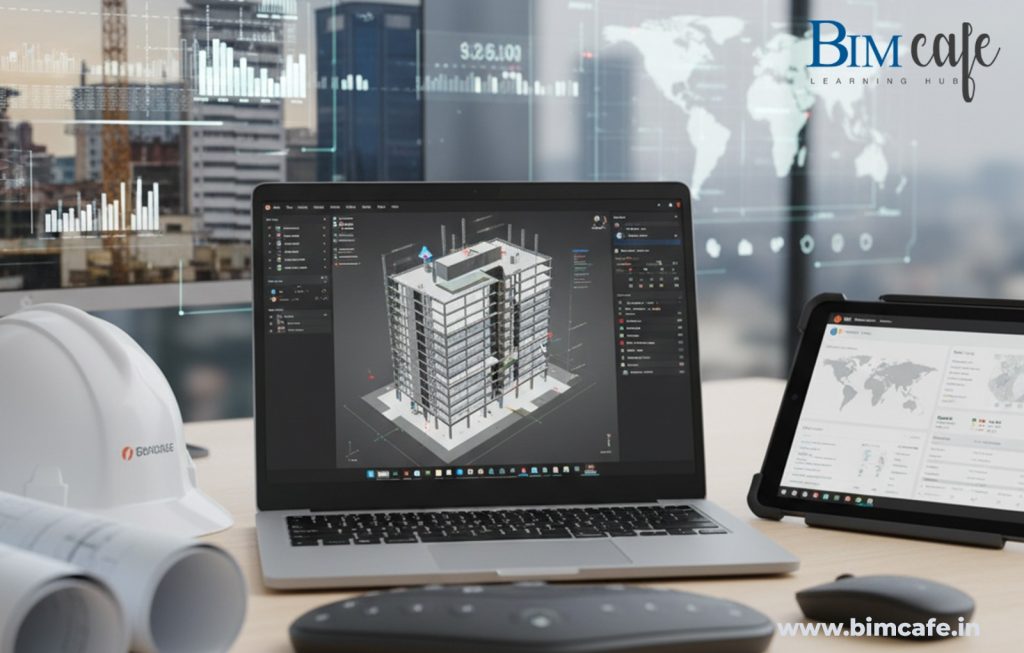
Author: Devika R
November 4, 2025
7 min read
Why BIM Skills Are the Gateway to Global Opportunities
When BIM-based projects began gaining traction in the Middle East, it became evident that Building Information Modelling (BIM) isn’t just software; it’s a new way of thinking about construction. Today, BIM connects every phase of a project — from design and documentation to facility management — creating smarter, faster, and more sustainable buildings.
Governments and developers in regions like the UAE, Saudi Arabia, and the UK have made BIM mandatory for most large-scale projects. As a result, skilled BIM professionals are now among the most sought-after experts in the AEC (Architecture, Engineering, and Construction) sector.
For students, engineers, and architects, this shift means one thing: learning BIM can open doors to global career opportunities. And if you choose a BIM course with placement, you gain not just technical expertise but also a direct bridge to employment — in India, the UAE, and beyond.
Different Types of BIM Courses with Placement
Not all BIM courses are designed the same way. Depending on your career goals and experience level, there are several types of BIM courses with placement to consider:
- Foundation BIM Courses with Placement:
Ideal for students and recent graduates, these programs focus on the fundamentals — Revit modelling, project setup, and basic coordination. They often include short internships or live project exposure. - Advanced or Specialised BIM Courses with Placement:
These are designed for working professionals or engineers who want to upskill. You’ll dive deeper into clash detection, BIM 360, Navisworks Manage, and interdisciplinary coordination between architecture, structure, and MEP systems. - Industry-Specific BIM Courses:
Some programs tailor training for niche sectors — such as infrastructure BIM, MEP BIM, or Scan-to-BIM workflows. These specialisations can significantly increase employability in specific roles or regions like the UAE. - Premium BIM Courses with Placement Assurance:
Comprehensive programs (like the one offered at BIM Cafe Learning Hub) provide 100% placement support, international project experience, Autodesk certification, and career mentorship.
The right course isn’t just about learning software; it’s about preparing for a real career in digital construction.
Why BIM Professionals Are in High Demand in the UAE and Abroad
Across the UAE and the wider Gulf region, governments are investing heavily in smart cities, digital infrastructure, and sustainable development. Projects like Dubai’s Expo 2020, Abu Dhabi’s Vision 2030, and Saudi Arabia’s NEOM all depend on BIM-based workflows to manage complexity and improve efficiency.
This surge in BIM adoption means that engineers, architects, and designers with proven BIM skills are highly valued — and often recruited from across India and other Asian countries. Globally, markets such as the UK, Singapore, and Australia also have strict BIM mandates, making certified professionals highly employable.
In short, BIM expertise has become a global passport for AEC professionals, and the UAE continues to be one of the most promising destinations for BIM careers.

Global BIM Adoption Trends: Where the Opportunities Are Growing
Over the past decade, Building Information Modeling (BIM) has transformed from a niche digital process into a global industry standard. Governments, developers, and contractors across the world are now mandating BIM for public infrastructure and private construction projects.
Countries such as the UAE, UK, Singapore, the United States, and Australia have made BIM adoption a national priority. In the Middle East, for example, Dubai Municipality requires BIM for large-scale projects — making BIM expertise one of the most sought-after skills in the region. Similarly, in the UK, BIM Level 2 compliance has become the foundation of digital construction workflows.
This worldwide adoption means that professionals completing a BIM course with placement gain access to a borderless job market. From smart cities in Saudi Arabia to transportation networks in Europe, opportunities for BIM-trained engineers, modelers, and coordinators are expanding faster than ever before.
The Global BIM Talent Gap – Why Skilled Professionals Are in Demand Everywhere
Despite rapid growth, there’s a significant shortage of skilled BIM professionals across the world. The construction sector is embracing digital transformation faster than educational systems can produce qualified talent.
Many international firms struggle to find professionals who understand both technical BIM workflows and project coordination, creating a global talent gap. This is where a BIM course with placement becomes invaluable — offering not just theoretical knowledge but practical, job-ready experience.
Countries like Qatar, Saudi Arabia, the UAE, the UK, and Canada are increasingly hiring BIM talent from India and Southeast Asia to fill this gap. Employers value professionals who can immediately contribute to 3D modeling, clash detection, and project documentation. The demand is high, and the supply is limited — a perfect opportunity for skilled candidates to build rewarding, globally mobile careers.
How BIM Shapes Smart Cities and Mega Infrastructure Projects Worldwide
BIM is not just a design tool — it’s the backbone of smart city and mega infrastructure development around the world. From the futuristic NEOM project in Saudi Arabia to Crossrail in London and Hudson Yards in New York, BIM enables real-time collaboration, sustainability, and precision in execution.
Through data-rich 3D modeling and digital twin integration, BIM helps governments and developers manage every stage of construction — from planning to maintenance. As cities become smarter and more connected, BIM professionals are playing a central role in ensuring that projects are energy-efficient, safe, and future-ready.
Completing a BIM course with placement prepares professionals to contribute to these global initiatives. Whether it’s modeling transportation systems, designing high-performance buildings, or coordinating international teams, BIM-trained engineers are shaping the cities of tomorrow.

Cross-Cultural Collaboration: Working on International BIM Teams
Modern construction is global — and so are its teams. A single project may involve architects in Dubai, engineers in India, and contractors in the UK — all collaborating in real time through cloud-based BIM platforms like Autodesk Construction Cloud, BIM 360, or Navisworks.
Working in such environments demands not only technical skills but also cross-cultural communication and teamwork. Professionals must understand diverse documentation standards, time zones, and coordination practices.
A BIM course with placement often simulates these global project conditions, helping learners adapt to international workflows. Students gain experience in remote coordination, version control, and multi-disciplinary integration — preparing them to succeed in multicultural, global project ecosystems.
Earning Potential and Career Growth in Global BIM Markets
The financial rewards of a BIM career are another compelling reason for professionals to invest in quality training. Globally, BIM professionals command competitive salaries — with strong growth potential across industries.
For example, BIM Coordinators in the UAE earn between AED 8,000 and AED 18,000 per month, while BIM Managers in the UK and Canada can earn between £45,000 and CAD 90,000 annually. Beyond monetary value, BIM roles offer long-term stability, career mobility, and leadership pathways.
With a BIM course with placement, learners can fast-track their entry into this global ecosystem. Placement programs provide not just skill certification, but also the mentorship and project exposure necessary to secure positions in reputed construction and engineering firms worldwide.
Key Skills You’ll Gain from a BIM Course with Placement
A well-structured BIM course equips you with both the technical and collaborative skills that modern construction demands. Here are some of the core competencies you’ll master:
- 3D Modelling and Documentation: Using Autodesk Revit for Architecture, Structure, and MEP systems.
- Clash Detection and Coordination: Identifying and resolving design conflicts using Navisworks Manage.
- BIM 360 / Autodesk Construction Cloud: Managing shared models and workflows in cloud-based environments.
- Scan-to-BIM & Point-Cloud Processing: Converting real-world scans into intelligent BIM models.
- Data Management and COBie Standards: Structuring BIM data for facility management.
- Soft Skills: Communication, teamwork, and project reporting — crucial for global collaboration.
These skills make you not only technically sound but also industry-ready — capable of contributing to projects from day one.
From Learning to Earning: How Placement Support Transforms Careers
The placement component of a BIM course is what turns knowledge into opportunity. Through mentorship, mock interviews, and real-project assignments, you gain more than just a certificate — you gain confidence.
At BIM Cafe, for example, students work on live international projects before they graduate. This exposure helps them understand real project standards, file-naming protocols, and interdisciplinary coordination — things employers in the UAE and Europe look for.
A structured placement program also provides:
- Resume and portfolio guidance
- One-to-one mentorship from industry experts
- Direct referrals to partner companies
- Guaranteed or assisted employment based on course type
In essence, you’re not left on your own after the course — you’re guided straight into the job market.
Career Opportunities After Completing a BIM Course with Placement
Once you complete your training, the career options are vast and diverse. Depending on your skills and experience, you can pursue roles such as:
- BIM Modeler (Architecture, Structure, or MEP)
- Revit Technician / Draftsman
- BIM Coordinator / Engineer
- BIM Manager
- Quantity Surveyor with BIM Expertise
- Clash Detection or Documentation Specialist
In the UAE, BIM professionals earn competitive salaries, with entry-level modelers starting around AED 4,000–6,000 per month and senior roles exceeding AED 12,000–15,000. Globally, the demand continues to rise as countries adopt BIM standards for public and private projects.
Why Choose a BIM Course with Placement in Kerala or the UAE
Kerala has quietly become one of India’s leading hubs for BIM training and talent. With a strong pool of civil and architectural graduates, Kerala’s BIM institutes are helping students transition seamlessly to GCC and international roles.
Choosing a BIM course with placement in Kerala allows learners to access high-quality training at affordable costs — while staying close to home before launching their overseas career. The UAE, on the other hand, offers advanced project exposure, on-site experience, and direct access to global employers.
Together, this Kerala-UAE training-to-employment bridge makes for one of the most practical career pathways for engineers today.

Building a Sustainable Career in BIM – The Long-Term Vision
A BIM course is not just a short-term investment; it’s the foundation for a future-proof career. With digital construction evolving rapidly, BIM professionals now lead initiatives in:
- Sustainable and green building design
- Digital twins and smart facility management
- AI-driven design automation
- Parametric and computational modelling
As you grow, you can progress from BIM Modeler to BIM Manager, and eventually into roles like Digital Construction Lead or Consultant. Continuous learning and certification updates will keep your skills relevant for the next decade of construction innovation.
Premium BIM Course at BIM Cafe Learning Hub
If you’re serious about building a global BIM career, the Premium BIM Course at BIM Cafe Learning Hub is one of the most comprehensive and career-oriented options available.
Here’s what sets it apart:
- 100% Guaranteed Job Placement in reputed firms across India, the UAE, and abroad.
- Two career-focused pathways:
- One-month intensive program with stipend-based project work and direct placement.
- An extended program with in-depth training, live international projects, mock interviews, and direct hiring by partner companies.
- Software & Tools Covered: Revit (Architecture, Structure, MEP), AutoCAD, Navisworks Manage, Recap Pro, Dynamo, DiRoots, Scan-to-BIM, and Autodesk Construction Cloud.
- Real Project Exposure: Students participate in multiple BIM projects across the UAE, UK, and US — covering LOD 200–350 standards.
- Certifications: Autodesk Certification + Industry-recognised BIM Project Completion Certificates.
- Eligibility: B.E., M.Tech, B.Arch, Diploma, or ITI in Civil, Architecture, or related disciplines.
- Mode of Learning: Online, offline, or hybrid — flexible for working professionals and students alike.
This program is designed not just to train you but to employ you — aligning every module with the latest international BIM practices and employer expectations.

Conclusion: Your Journey Starts Here
The future of construction is digital, and BIM is at its core. Whether you’re a student just starting out or a professional looking to upskill, enrolling in a BIM course with placement can be your launchpad to global success.
From mastering cutting-edge tools to gaining international project exposure, you’ll be equipped to take on high-impact roles in the UAE and across the world.If you’re ready to take that step, explore the Premium BIM Course at BIM Cafe Learning Hub and start building not just models — but a global career that’s future-ready. Contact BIM Cafe to learn more or speak to a course advisor




